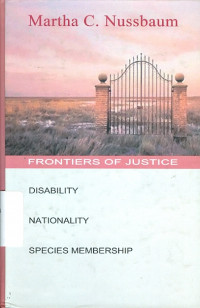
Text
Disability, Nationality, Species Membership
Theories of social justice are necessarily abstract, reaching beyond the particular and the immediate to the general and the timeless. Yet such theories, addressing the world and its problems, must respond to the real and changing dilemmas of the day. A brilliant work of practical philosophy, Frontiers of Justice is dedicated to this proposition. Taking up three urgent problems of social justice neglected by current theories and thus harder to tackle in practical terms and everyday life, Martha Nussbaum seeks a theory of social justice that can guide us to a richer, more responsive approach to social cooperation.
The idea of the social contract--especially as developed in the work of John Rawls--is one of the most powerful approaches to social justice in the Western tradition. But as Nussbaum demonstrates, even Rawls's theory, suggesting a contract for mutual advantage among approximate equals, cannot address questions of social justice posed by unequal parties. How, for instance, can we extend the equal rights of citizenship--education, health care, political rights and liberties--to those with physical and mental disabilities? How can we extend justice and dignified life conditions to all citizens of the world? And how, finally, can we bring our treatment of nonhuman animals into our notions of social justice? Exploring the limitations of the social contract in these three areas, Nussbaum devises an alternative theory based on the idea of "capabilities." She helps us to think more clearly about the purposes of political cooperation and the nature of political principles--and to look to a future of greater justice for all. “In her new and pathbreaking book, Martha Nussbaum shows that the social contract tradition, despite its great insights, cannot handle some of the most important political problems of our day, and she points the way to a conception of justice more attuned to our human frailty, our global society, and our place in the natural world. This work will change how we think about the nature of social justice. “For over thirty years, thanks to John Rawls's great work, the idea of a social contract has provided the dominant framework for liberal theories of justice. Frontiers of Justice is the most important challenge to this framework from within liberalism since the ascendancy of Rawls's theory. Eschewing utilitarianism, Nussbaum draws on the capabilities approach she developed elsewhere to show deep problems with using the social contract idea for modeling the liberal ideals of inclusiveness and equal respect for human dignity. The book's impact on liberal political thought will be resounding. Its arguments and program are bound to be discussed for a long time.” “Prevailing ethical theories neglect three important subjects: the treatment of persons with disabilities, the scope of justice beyond the nation state, and duties owed to non-human animals. Martha Nussbaum's landmark book offers a courageous and bold approach to these issues based on fellowship and respect. Honest about where it builds on past theories and where it departs from them, Frontiers of Justice boldly and elegantly charts the territory for much needed theoretical and policy debates. aims to widen the reach of Rawlsian theory by addressing questions it has thus far largely neglected, such as the role of distributive justice in international relations, the claims of disabled people and the moral status of nonhuman animals. Nussbaum's resourceful and imaginative exploration of Rawls's work displays a command of the longer tradition of political philosophy that matches and even surpasses that of Rawls, along with a notably richer sensitivity to the history and variety of constitutional arrangements. The result is a notable contribution to philosophical inquiry that merits the most careful study by all who try to think seriously about public policy.
Availability
| KP.IV.5.00017 | KP.IV.5 NUS d | My Library | Available |
Detail Information
- Series Title
-
-
- Call Number
-
KP.IV.5 NUS d
- Publisher
- London, England : The belknap press of harvard university press., 2007
- Collation
-
487 hlm. ; 25 cm.
- Language
-
English
- ISBN/ISSN
-
978-0-674-01917-1
- Classification
-
KP.IV.5
- Content Type
-
-
- Media Type
-
-
- Carrier Type
-
-
- Edition
-
-
- Subject(s)
- Specific Detail Info
-
-
- Statement of Responsibility
-
-
Other version/related
No other version available
File Attachment
Comments
You must be logged in to post a comment
 Computer Science, Information & General Works
Computer Science, Information & General Works  Philosophy & Psychology
Philosophy & Psychology  Religion
Religion  Social Sciences
Social Sciences  Language
Language  Pure Science
Pure Science  Applied Sciences
Applied Sciences  Art & Recreation
Art & Recreation  Literature
Literature  History & Geography
History & Geography